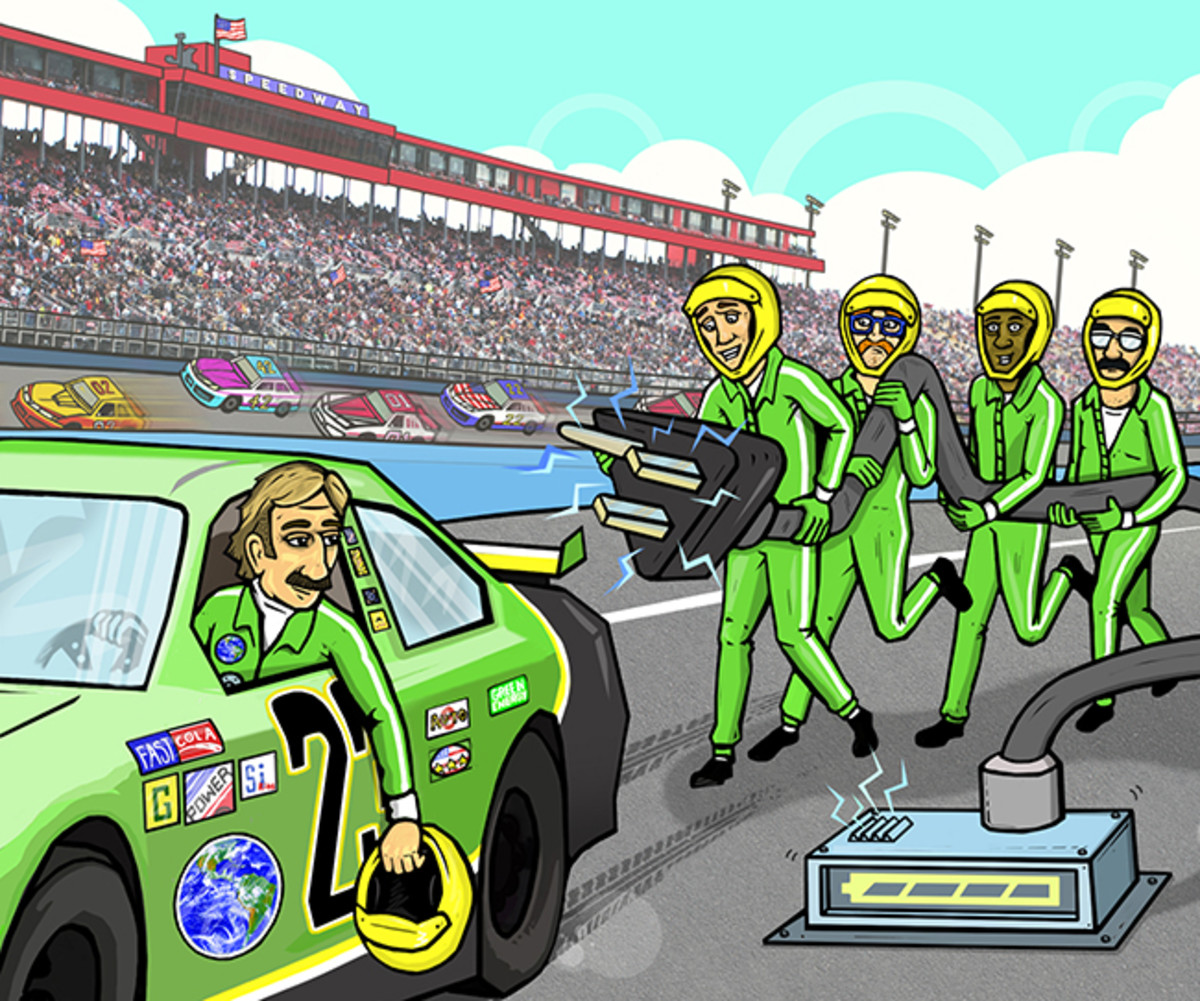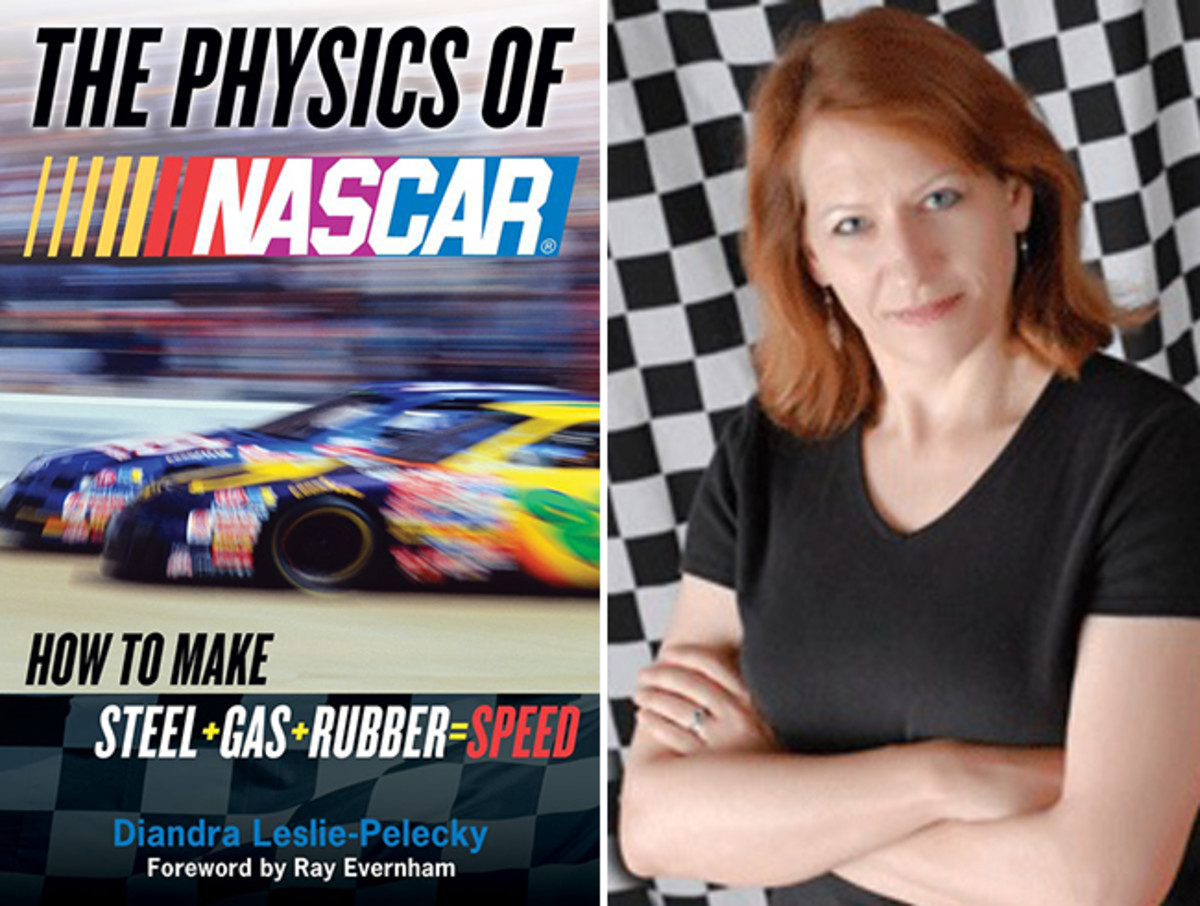Should NASCAR Go Electric?


When Denny Hamlin edged Martin Truex Jr. to win the Daytona 500 in February, he did it in a Toyota Camry. Truex Jr. was also in a Toyota. As were third-place finisher Kyle Busch and fifth-place Carl Edwards.
Not a big deal, right? There are more Camrys on U.S. roads than any other car. Until 2007, though, Toyota was kept out of NASCAR's top circuit because non-American car companies were barred from competing. When that rule was changed, NASCAR traditionalists were outraged. Some even thought it meant the end of the American automobile. But nearly 10 years later, Toyota has shown it can coexist with Ford, Dodge, and General Motors — and NASCAR remains alive, even if it’s struggling.
The opposition to Toyota might seem like it has nothing to do with climate change. But the fierce dedication fans have for NASCAR heritage is a problem for a sport built on cars burning gasoline and spewing exhaust into the atmosphere, says mechanical engineer and superstar scientist Bill Nye.
“NASCAR sort of celebrates the past,” Nye tells SI Kids. “But now we have climate change. We have a very serious situation facing us, and it occurred to me that NASCAR could be part of the solution rather than part of the problem.”
Nye comes from a family of race fans. He has watched NASCAR since the 1960s when he was a kid. And he absolutely understands the appeal of the spectacle: the sound of roaring engines, the smell of gasoline, the excitement of rooting for a favorite driver. But NASCAR is “a little bit primitive,” he adds. Its cars are way too inefficient, and the organization is holding back innovation in the name of tradition (and showmanship).
In an essay in his book Unstoppable: Harnessing Science to Change the World and later expanded on the website Aeon, Nye writes, "To address climate change in the medium and long term, we have to stop, completely stop, burning fossil fuels.” The best way to do that, he says, is to move to electric vehicles (EVs).

NASCAR can help lead that effort by showcasing what EVs can do. The sport should go electric — as soon as possible — not only in the name of progress, but for the good of our planet.
“I’m not an expert on the engines that NASCAR has used over the years. But they’re not electric. And they’re not the future,” Nye says. “I’ve run the basic numbers [on electric motors] — power, torque, energy, number of miles you have to go — it sure looks doable to me.”
Not so fast, says physicist Dr. DiandraLeslie-Pelecky, the author of The Physics of NASCAR and a frequent contributor to NASCAR’s SiriusXM Speedway radio show. In a post on the website Building Speed, Dr. Leslie-Pelecky responded to what she called Nye’s “well-intentioned” but “terribly misguided and ill-informed” suggestions.
“I have a huge amount of respect for Bill Nye. He has done amazing things for scientists. But I think on this topic he’s a little off base,” she tells SI Kids. “He looked at something and said, ‘Oh, they’re racing gasoline. They should race electricity.’ The primary reason why NASCAR can’t change over to electric cars right away is safety. If you knew anything about NASCAR you would understand that developing a race car is a decade-long process.”
Part of that process involves changing fans’ attitudes toward the nature of NASCAR itself. People love attending races for the visceral experience that comes from a high-octane car roaring around a track — which you don’t get with EVs. In the all-electric Formula E circuit in Europe, for example, racecars buzz like sci-fi spaceships rather than growl like beefy gas-guzzlers. Take that away and longtime fans would likely wave goodbye, too.
“There were people who stopped watching NASCAR when Toyota came into the sport because they’re not an American manufacturer,” Dr. Leslie-Pelecky says. “NASCAR has realized they have to bring things along slowly.”

NASCAR has taken steps toward sustainability. In 2008, it launched a platform called NASCAR Green to enact environmental programs like the installation of solar panels at tracks and tree planting to offset its carbon emissions. And in 2011, race vehicles began using an ethanol-blend biofuel.
But Nye says that’s not enough. NASCAR needs to make real moves toward innovation and EVs now. Both Nye and Dr. Leslie-Pelecky say one way that could happen is competition from a company like Tesla. Tesla builds high-performance electric cars, and it could offer valuable insight into an electric future for auto racing.
They also agree that climate change is real. But despite near universal agreement in the science community, there are climate-change doubters who push back against the call to stop burning fossil fuels. And that gets us back to the original question: What is NASCAR’s role in changing attitudes?
“If you’re going to put a whole bunch of money into one effort to try to convince people of [climate change], I’m not sure NASCAR is the way to go,” Dr. Leslie-Pelecky says.
“I disagree with that completely,” Nye says. “Whatever you think they’re doing or not doing now, there is an opportunity. NASCAR could be a world leader.”
Photos: Adam Doyle (illustration), Jesse DeFlorio (Nye), drdiandra.com (Leslie-Pelecky)
